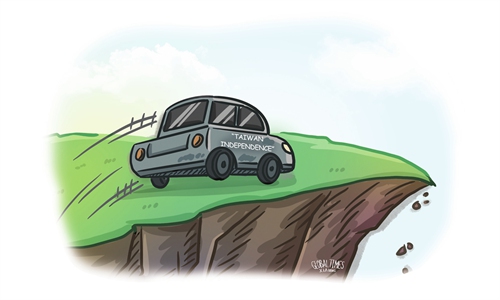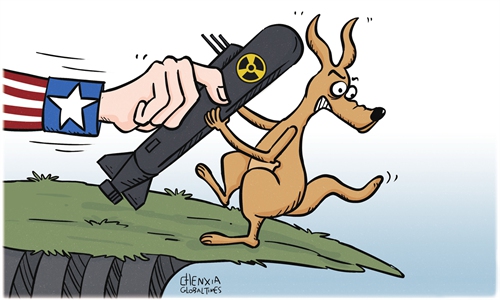Stable China economic partnership could help boost Australia’s strategic autonomy

Photo: VCG
Editor's Note:Recent calls by multiple former senior Australian officials and political party leaders to reconsider the country's foreign policy direction, including debates over AUKUS, reflect a growing domestic discussion about reducing over-reliance on the US and pursuing a more balanced approach. Meanwhile, despite some discordant notes in China-Australia relations, bilateral economic and diplomatic engagement continues to improve. This trend has prompted deeper reflection on how Canberra can maintain constructive ties with Beijing while preserving strategic flexibility.
At the 7th International Forum on Security and Strategy, recently held by the Center for International Security and Strategy of Tsinghua University, Steve Howard (Howard), the founding secretary general of the non-profit Global Foundation, told Global Times (GT) reporter Su Yaxuan that he did not believe Australia would risk its relationship with China over geopolitical issues like AUKUS. "China is Australia's biggest export partner - why risk it?" he remarked.
GT: Former Australian foreign minister Gareth Evans recently admitted that Australia's no-holds-barred embrace of AUKUS is likely one of "the worst defense and foreign policy decisions" it has made and risks Australia's sovereignty and independence. Do you agree with this assessment? Will AUKUS diminish Australia's ability to make independent decisions?
Howard: I understand that there are many ongoing discussions in Australia regarding AUKUS and what it means for the country's future. People are debating both the potential benefits and the possible risks associated with this agreement. Given the complexities of the issue, it is natural that different perspectives are emerging.
Gareth Evans is a highly regarded and experienced figure in Australian politics and international affairs, so his opinions carry significant weight. When someone of his stature speaks on matters of national security, it is important to take his views seriously and consider them carefully.
I believe Australia needs a more comprehensive national dialogue about our long-term security strategy. The world is undergoing profound changes, many senior figures in government, defense and policy circles have already emphasized the need to rethink how we define our security interests and our broader role on the global stage. As a result, Australia must reassess its position both domestically and internationally.
In light of these discussions, I honestly don't know whether AUKUS will maintain Australia's ability to make independent decisions.
GT: Recently, former prime minister Malcolm Turnbull warned about the risks of Australia becoming overly dependent on the US, stating that the closer you are to the US, the more it thinks it can extract value from you. He emphasized the importance of Australia maintaining its independence. However, during his time in office, his policies were considered pro-US. Why do you think such a shift occurs?
Howard: Australia has a long-standing security alliance with the US through the ANZUS Treaty. AUKUS, however, is a more recent development. The US came to Australia's aid, with some even arguing that the US effectively saved Australia from a potential invasion. This historical connection remains deeply embedded in Australia's national consciousness and continues to shape public attitudes toward its strategic partnerships.
That said, there is a growing recognition that Australia must think more critically about its future in an increasingly complex global landscape. Other nations are recalibrating their strategies to align with their own interests, and Australia, as a wealthy nation situated in the Asia-Pacific region, must navigate its position carefully.

Steve Howard. Photo: Courtesy of Howard
GT: How should Australia balance its alliance with the US and ties with China to maintain security, stability and independence?Howard: In the near future, I believe Australia will have a broad national discussion on how best to structure its security policies moving forward. However, it is crucial to recognize that when people talk about security, they often focus solely on military or "hard" security. A nation's security - whether it be China, Australia, or any other country - first and foremost depends on its economic security.
This leads to an important question: What steps will Australia take to ensure its economic security in the years ahead? Economic strength is the foundation that allows a country to make independent strategic decisions, including in defense. At present, Australia's economic well-being is heavily tied to China, its largest export partner. This economic relationship has stabilized and is showing signs of improvement, but there is still more to be done to deepen and strengthen these ties. A stable and prosperous economic partnership with China could provide Australia with the leverage and flexibility it needs to navigate the challenges of an evolving global order while maintaining a greater degree of strategic autonomy.
Overall, the Asia-Pacific region is relatively stable, but we cannot predict the future. It would be beneficial if China and the US could serve as stabilizers in the region, but if their relationship leads to turmoil, it would be disastrous.
GT: What do you see as the biggest challenge for Australia in improving its relationship with China? How should this challenge be addressed?
Howard: Understanding. The cultural and value differences between Australia and China are significant, which can sometimes lead to misperceptions or misunderstandings. One of the most effective ways to enhance understanding is through more frequent exchanges and dialogues, just like the one we are having now. These interactions help to build familiarity and trust. However, beyond cultural exchanges, I believe what is truly needed are more direct and frank conversations between the two nations - discussions that not only acknowledge differences but also identify areas of shared interests and cooperation.
Looking ahead, one of the most promising areas for collaboration is in decarbonization. Both Australia and China have a shared interest in transitioning to a more sustainable future. By working together, the two countries can develop cleaner, more efficient methods of steel production, leveraging renewable energy and innovative technologies to reduce carbon emissions.
In summary, while cultural and ideological differences present challenges, open dialogue and pragmatic cooperation can help Australia and China build a more stable and mutually beneficial relationship.
Moreover, I don't think Australia would risk its relationship with China over AUKUS. China is Australia's biggest export partner, and its economic security depends on this relationship. Given how vital these ties are, it seems unlikely Australia would jeopardize them over geopolitical issues like AUKUS. Why risk it?
GT: You mentioned that political relations between Australia and China are improving. Where do you think China-Australia relations currently stand? What's your outlook on the future of bilateral relations?
Howard: I believe the relationship between Australia and China will continue to improve, but it may be a gradual process. I think we should push the process by finding common ground, not just between governments but also across various sectors - private enterprises, citizens, institutions and think tanks. This broader engagement is crucial to fostering a more comprehensive and lasting relationship between the two countries.
There is a perspective that the world is in need of a new, multipolar order, and I'd like to say: Come on!
I believe we should work together to face this challenge. We can address these issues through multilateral alliances. For example, China has made significant progress in air pollution control and can share its experiences with the world. In emerging sectors, China has already been very active, passing on its knowledge to countries like Australia. China has the ability to make this happen, and I believe it will.


